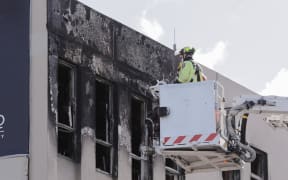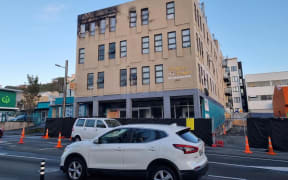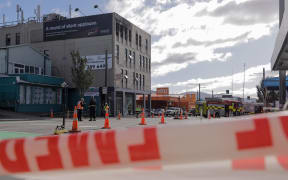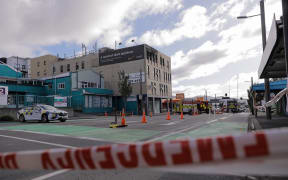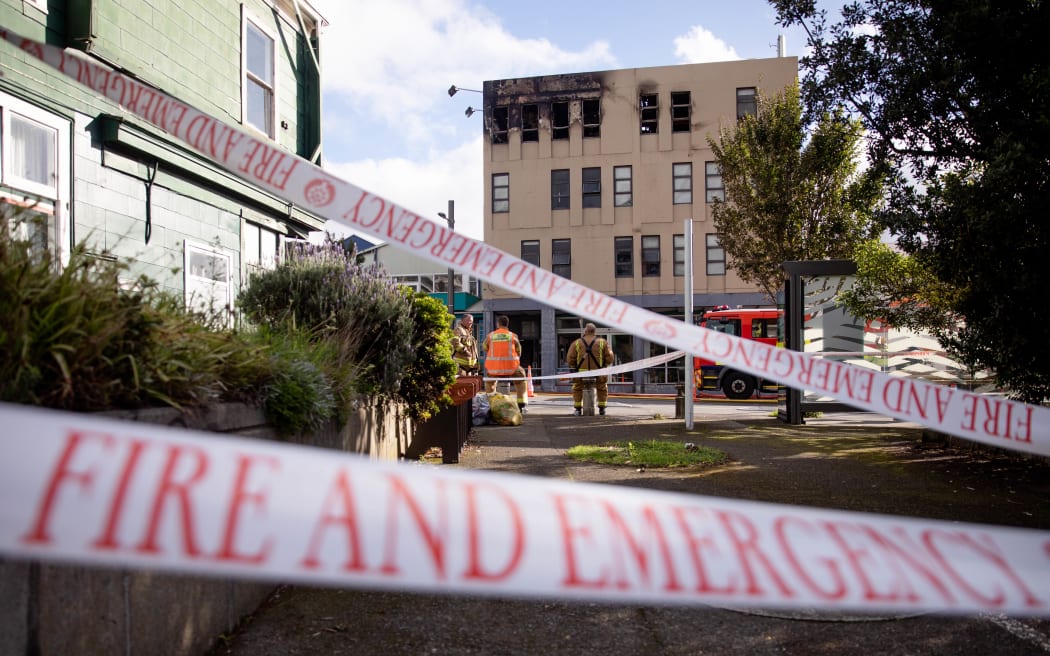
Loafers Lodge. Photo: RNZ /Angus Dreaver
The three councils with the most boarding houses like Loafers Lodge in their area have all been told recently to improve their building warrant of fitness (WOF) systems.
At Auckland Council, each inspector had almost 1000 buildings to check on. The council also was flagged for not checking if safety systems in buildings actually matched what was on the safety checklist - though the council disputed this.
Wellington's auditing and enforcement system needed beefing up to meet "both legislative requirements and public expectations" - its shortcomings were laid bare after Loafers and revealed by RNZ at the time.
And while Queenstown Lakes was better than the other two, it was still too lax about checking in-person if a building's fire and other safety systems - often a dozen or more of them - were in order.
The findings are from the latest score sheets released under the Official Information Act by the safety watchdog, the Ministry of Business, Innovation and Employment (MBIE), covering all 67 councils' building WOF systems, done in 2021 and 2022.
Many councils scored poorly, though even some of these poor scores were better than in earlier assessments.
A focus after Loafers is on Queenstown, Auckland and Wellington as they have the bulk of the 70 boarding houses with a similar design, as identified nationwide by urgent checks since the fire at Loafers Lodge killed five people in May.
MBIE said site inspections would begin soon.
"These assessments will focus primarily on fire safety and healthy homes compliance."
Auckland Council told RNZ on Thursday: "We have audited all known boarding houses in Auckland and have a process in place to audit these annually."
It had earlier reported having about 155 boarding houses all-up. RNZ has asked for more details.
Queenstown Lakes said it had identified for MBIE 22 buildings classed as either backpackers, lodges or staff accommodation - seven of them three or more storeys high, like Loafers. Three of the seven had been audited and the other four would be done over the next few months.
"We don't identify any buildings in our district as specifically 'boarding houses' but note that, following the Loafers Lodge fire, MBIE requested 'information on the stock of boarding houses (or similar types of accommodation)'. Hence we have provided MBIE with a list of all dedicated commercial accommodation buildings in our district."
Wellington City Council said it had conducted WOF audits at all of its 25 boarding houses similar to Loafers last month.
MBIE had been tightening up for a couple of years on monitoring councils' building WOF systems.
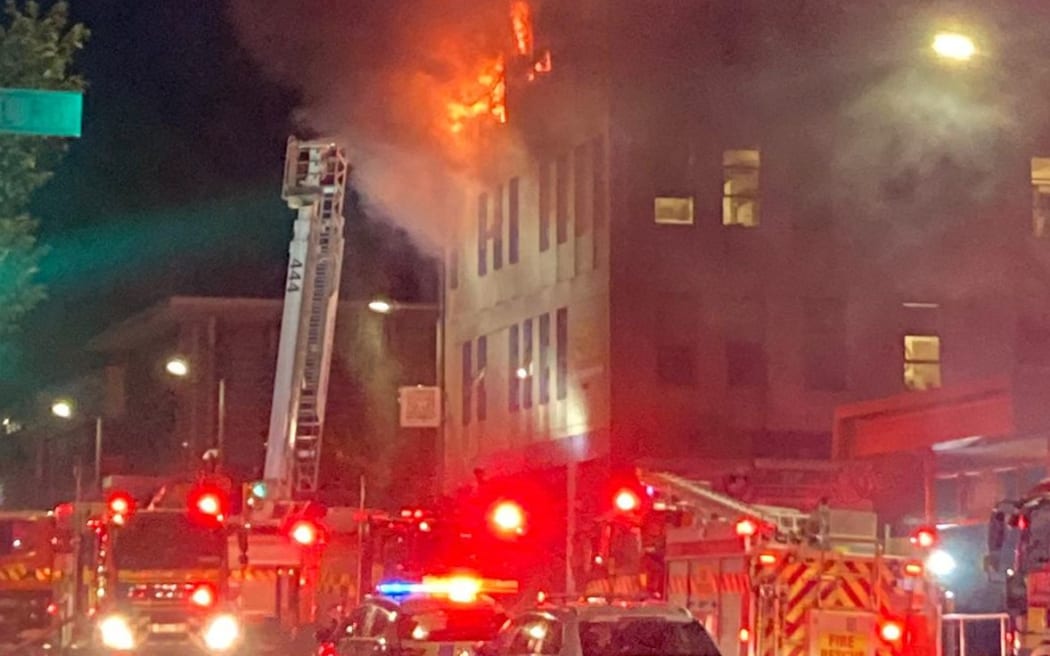
Flames seen in the top storey of the Loafers Lodge accommodation in Adelaide Road, Newtown, Wellington. Photo: Supplied / Axel Dann
Additionally, since Loafers, it had begun working to tighten up who gets to sign off that buildings are okay - to put more rules around the largely unregulated sphere where self-employed independent operators with widely varying qualification levels were responsible for the annual WOF checks.
Council inspectors were then meant to go around and double check on 20-30 percent of all the buildings each year, to cover a city's entire stock within three to five years. But that had not been happening at many of the 67 councils.
Auckland got a red flag in the November 2022 assessment for double checking just 10 percent. The ministry told Auckland to hire more staff, "sufficient to enable an increased number of on-site [building] WOF audits to be undertaken".
Auckland's second of two red flags - the lowest possible score - was for not knowing how many of the checklists at its 16,700 buildings did not comply with the law, though it had had a decade to get them up to date. Sort this out, MBIE told it.
By contrast, Queenstown Lakes District scored 96 percent for compliance with its checklist compliance schedules.
Auckland was orange-flagged in six different ways, including for not checking on-site within six months at new or renovated builds, to alert owners to keeping their safety systems in order.
Auckland Council told RNZ on Thursday it had increased its auditing capacity by redeploying commercial inspection teams in what was planned to be a permanent move.
RNZ had previously reported on large and serious gaps in Wellington's building WOF approach prior to the Loafers fire.
It promised to do better, after it was shown to have been doing on-site audits at just 3.3 percent of buildings per year, instead of 20-30 percent (and boarding houses are meant to be checked every year). There was little enforcement going on either, the 2022 MBIE assessment said.
Wellington City Council said on Thursday it was committed to achieving the 20-33 percent-a-year on-site audits target.
"We have increased resources in this area and over the next few months will be focused on significantly increasing the number," a council statement said.
By contrast, Auckland issued almost 1400 notices to fix and 248 infringement notices in the three years to May 2022.
The assessments found many of the 67 councils had been playing fast and loose by accepting WOF reports other than the official ones, "in contradiction" of the law - and told them to stop.
Auckland and Queenstown were among those doing this.
Queenstown got no red flags, but was orange-flagged for doing on-site audits at just 7 percent of buildings in the three years to May 2021. Earlier, it told RNZ it had doubled that to 15 percent more recently, still behind the 20-30 percent recommended.
"Despite a challenging employment market we're working hard to move closer to MBIE's target and, in doing so, use a risk-based assessment to prioritise those buildings at higher risk," Queenstown told RNZ on Thursday.
"We are not aware of any non-compliant buildings in our district."
As well as owners being responsible for annual checks, they had to get a qualified person to do monthly inspections of the fire alarm and sprinkler systems, if fitted, it said.
As fo tightening up on 'qualified persons' WOF checks, the ministry said it was looking at creating a national register, stronger offences and penalties, nationally consistent competency requirements, conflict of interest declarations, a fit and proper person test and a code of ethics.
* RNZ has an assessment report for each of the 67 councils. These are available on request if any member of the public wishes to see one.

